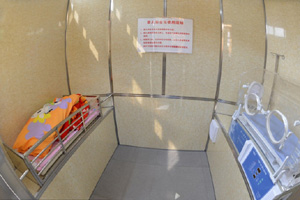The last resort
Tianjin residents expressed contrasting views about the baby hatch. "It sends out the wrong message to society," said one man who was passing by the baby hatch. "Parents will have an excuse to leave children to the government and go away without feeling too guilty. It's a way of shirking parental responsibility."
Another resident was more supportive: "What can a low-income couple do if they have to pay 300,000 yuan ($48,400) for surgery? The baby hatch is the last resort for desperate parents."
Gao Yurong, director of the Child Welfare Research Center at Beijing Normal University, said: "Abandoning babies is illegal in China, irrespective of where you leave them. But that doesn't justify not having baby hatches. They are two different things. The baby hatch does not protect parents from being condemned; it protects the lives of the babies."
The first baby at the hatch in Tianjin was left on the floor in a handbag, well below the crib. "Those who came to abandon their babies were too nervous to even put the baby into the incubator or the crib," said one guard at the children's welfare institute who preferred not to be named.
"People were aware that their behavior was disgraceful, so they usually came to drop off the babies and ran away quickly," he said. "Some wrapped scarves around their faces and wore hats pulled low over their eyes."
Zhang Min of the Tianjin institute said the baby hatch opened on Jan 1 and the institute had received 35 babies by March 12, compared with 66 adopted by more conventional means during the whole of 2013.
"The baby hatch is intended for newborns, but we were shocked that children as old as 6 have also been abandoned, because the guaranteed anonymity means few restrictions," said Zhang Min.
Zhang Shuwen, who oversees the Tianjin institute's nursery for children aged 3 or younger, said the large number of abandoned children is posing severe problems. "The situation at our institute is a big headache. Few beds are available now. We are figuring out ways to build more beds and employ more dry nurses. Sometimes, three dry nurses have to look after a room of more than 10 babies with illnesses or disabilities," she said.
Huge numbers
Compared with other pilot cities in the program, Tianjin has seen the lowest number of abandoned babies.
The hatch in Guangzhou, Guangdong province, opened on Jan 28. By March 16, 262 babies had been left there, said Xu Jiu, head of the Guangzhou Social Welfare Institute.
A lack of facilities to support the overwhelming number of abandoned babies forced Guangzhou's welfare authorities to suspend its baby hatch on March 16.
But the discussions prompted by the program have not stopped.
"Even if there were no baby hatches, kids would still be abandoned, maybe in a dumpster. With baby hatches, we see a more-accurate number of abandoned babies, but that doesn't mean more babies are being abandoned, neither does the program encourage such an act," said Wang Zhenyao, head of the China Philanthropy Research Institute and a former senior official at the Ministry of Civil Affairs.
"The baby hatches provide a humane facility," he said. "But the tragedy of scores of babies being abandoned is another thing altogether. It's mainly a result of the lack of an inclusive severe-disease insurance or aid system to help children in China. In most cases, the families are expected to bear most of the medical costs for their babies," he added.
For Gao, the closure of the Guangzhou baby hatch has been frustrating. "I feel sorry and ashamed about it. But the publicity surrounding baby hatches has highlighted the weaknesses in China's child welfare system and prompted the authorities to improve the system. That's a good thing."
Wang Zhengyang, a migrant worker at a hardware factory in Guangzhou, borrowed money from every friend and relative he could contact to raise funds for the treatment of his 2-month-old daughter, Huihui, who was diagnosed with congenial biliary atresia, a life-threatening liver condition.
"Because we have rural hukou (household registration), the new rural cooperative medical system only reimburses about 10 percent of our medical expenses," he said.
But even if Huihui had an urban hukou, biliary atresia is not included in the list of diseases covered by the severe-disease insurance system.
"Many people encouraged my wife and me to give up our baby. But we didn't," Wang Zhengyang said. "We went all-out to tell our story online, looking for any possible help. Luckily, Huihui got the chance of a liver transplant thanks to public donations raised by an army of volunteers and the media attention.
"The transplant happened about six months ago, and Huihui is now alive and kicking, just like any normal kid, except she's on lots of medication. But there are many families poorer than we are, whose children are now in danger without timely surgery," he said.
For mainstream welfare experts, the crucial task that governments must now address to establish a unified health allowance or insurance system to help children with severe illnesses and disabilities as soon as possible, so that far fewer will be abandoned.
"It may not be a matter of money, but a matter of how the money is spent. The country should put more effort into subsidizing families with severely ill children. After all, children should grow up with their families," said Wang Zhenyao from the China Philanthropy Research Institute.
Contact the author at: dongfangyu@chinadaily.com.cn
Zhang Min in Tianjin contributed to this story.
 |
 |
| Xiamen's safe haven receives 1st unwanted baby | Baby hatches reveal deficient children's welfare |
